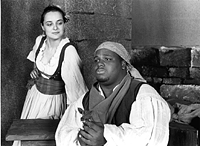

During a significant chunk of the 19th century, opera was everything. Italians flocked to La Scala in Milan to escape political struggles; French socialites took shelter at the Paris Opéra. On the opening night of Georges Bizet's Carmen , a packed Hall Theater housed over 500 opera fanatics of all ages, entranced by the opera comiqué of one Carmencita and her pair of lovers and trials that span this massive four-act masterpiece. And, with nearly flawless effort, the Conservatory's Opera Theater pulled off what is arguably the best performance of the year.

Even with potential first-night jitters, every aspect of Wednesday's performance was far above par. From the Chamber Orchestra's tight overture to the final chorus, Carmen ran its course in all the splendor of a grand opera. Punctuated with larger-than-life sets and the depth of talent and experience from a cast whose debut has been three months in preparation, the full performance left its audience more than satisfied, even after sitting through three intermissions, four hours and five curtain calls worth of French opera.
Sung in the original French, Carmen marks a milestone for the history of Opera Theater at Oberlin, breaking the 15 year-long tradition of English-only performances. The intent of this decision was most likely to make opera accessible to a primarily English-speaking campus. However, there is something to be lost in the translation from Prends garde a toi! to "Watch out for yourself!" Thankfully, this weekend's production is performed entirely to score, remarkably authentic with the help of French advisors Sylvan Suskin and Christoph Lagier, professors of musicology and French, respectively.
It didn't hurt Wednesday's production, either, that Carmen herself was played by a true Frenchwoman, conservatory junior Marie Lenormand. Lenormand, like Carmen, stole the spotlight with her seductive arias and witty recitatives.
As the gypsy cigarette girl who pays the ultimate price for flaunting a life with no strings attached, Lenormand's mannerisms were perfect. With a mere flash of the eyes, she had the audience as infatuated with her as Don José - a difficult role in itself, mastered by conservatory junior Limmie Pulliam, Jr.
While Carmen's immensely popular melodies - sung in every language by every great - stack grim comparison and competition for non-professionals, Lenormand's voice shone through all of them, particularly brilliant in one of opera's best-known arias, her "Habanera" song in Act I. Lenormand played up the part, smirking deviously at the audience as she went, joined triumphantly by the full chorus, who responded keenly on cue; rich and full without detracting from the title-role's moment.
Perhaps due to Bizet's score (conducted by highly acclaimed Stephen Lord, OC '71), or maybe because of some opening night hesitations, it seemed as if Pulliam had a bit of trouble getting into his corporal role at the start of the production. While Lenormand took captivated the audience literally from her first scene, stirring steamy chemistry on stage with the street urchins and corporals, alike, it took Pulliam a bit to get warmed up.
However, he finally did triumph, alongside his intended, Micaela (played by conservatory senior Stacy Rigg), in their duet midway through the first act. Rigg and Pulliam played off Micaela's innocence and Don José's longing for her with grace. It was in this scene that Pulliam seemed to drop into his role, now fully focused and believably in love with Micaela. Not to mention, Rigg's stage presence was excellent, as was that of the other supporting female roles played by conservatory junior Rhiannon Giddens, and especially from double-degree junior Arden Kaywin.
While Pulliam managed to create chemistry even with the character he ends up deceiving, his truly shining moment came toward the end of the second act at Lillas Pastia's Tavern (wonderfully staged with real torch light, producing only one minor fire hazard mid-act). After Carmen is angered at Don José after almost leaving her for the call of duty, Pulliam's solo profession of his love was truly his most passionate scene of the night.
In fact, not a single Carmen cast member left anything to be lacked on Wednesday. Though the performance was long, it kept to as true to the clock as possible, in-between uproars of applause after nearly every single scene, loudest after Lonormand's arias. The other audience favorite was conservatory junior Christopher Holmes' portrayal of Carmen's lover, Escamillo, the brave toreador. During his trademark song at the tavern, Holmes flailed his cape around wildly, fittingly over-confident in his rants of the bull-fighting life.
After falling in love with Escamillo and her falling-out with Don José, Carmen's cards turn up "Diamond! Spade! Death!" in Act III and the mood of the opera shifts from craftily flirtatious to dramatically tragic. The cast followed through every step of the way, heightened by Lonormand's now-widened vocal range, and the orchestra's warning chromaticisms and violin tremolos building drama all the way through the final arena scene.
By the time the bloody murder finally concluded the evening, the audience was so enraptured that an incredulous series of curtain calls and a standing ovation followed. Lonormand, who clearly made this great work grand, looked as if she was close to tears.
Carmen shows tonight, Nov. 22 and Nov. 23 in Hall Auditorium. All performances are sold out; standing room only available.
Prends garde a toi!: Conservatory juniors Limmie Pulliam, Jr. and Marie Lenormand, who appear Saturday, delivered nearly flawless performances at Carmen's opening night. (photo by Gitta Zomorodi)
Copyright © 1997, The Oberlin Review.
Volume 126, Number 10, November 21, 1997
Contact us with your comments and suggestions.